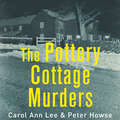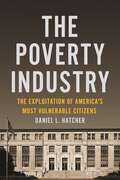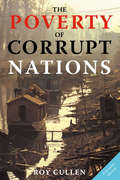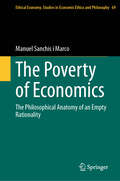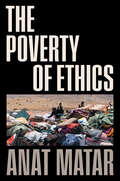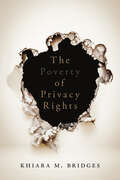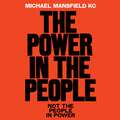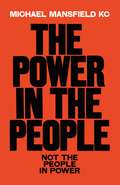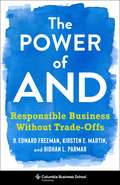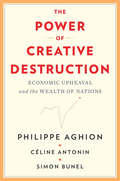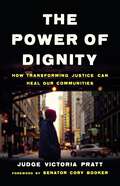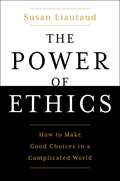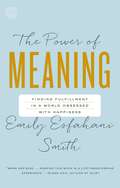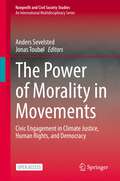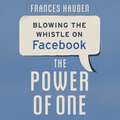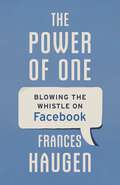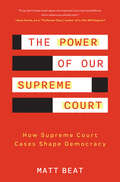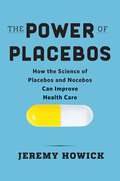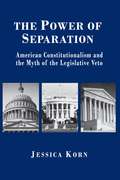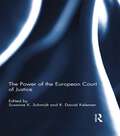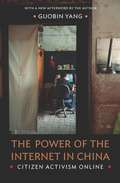- Table View
- List View
The Pottery Cottage Murders: The terrifying true story of an escaped prisoner and the family he held hostage
by Carol Ann Lee Peter HowseIncludes an exclusive interview with Peter Howse and Carol Ann LeeA psychopathic criminal on the run from prison. A family of five held hostage in their home. A frantic police manhunt across the snowbound Derbyshire moors. Just one survivor.The definitive account of the terrifying 1977 Pottery Cottage murders that shocked Britain. For three days, escaped prisoner Billy Hughes played macabre psychological games with Gill Moran and her family, keeping them in separate rooms of their home while secretly murdering them one by one. On several occasions Hughes ordered Gill and her husband Richard to leave the house for provisions, confident that they would return without betraying him in order to protect their loved ones.Blizzards hampered the desperate police search, but they learned where the dangerous convict was hiding and closed in on the cottage. A high-speed car chase on icy roads ended with a crash and the killer being shot as he swung a newly sharpened axe at his final victim. This was Britain's first instance of police officers committing 'justifiable homicide' against an escapee. The story of these terrible events is told here by Carol Ann Lee and Peter Howse, the former chief inspector who saved Gill Moran's life over forty years ago.Peter's professional role has permitted access to witness statements, crime scene photographs and police reports. Peter Howse and Carol Ann Lee have made use of these, along with fresh interviews with many of those directly involved, to tell a fast-paced and truly shocking story with great insight and empathy.
The Poverty Industry: The Exploitation of America's Most Vulnerable Citizens (Families, Law, and Society #11)
by Daniel L HatcherHow funds for the needy are siphoned off for profit: &“A distressing picture of how states routinely defraud taxpayers of millions of federal dollars.&” ―Boston Review Government aid doesn&’t always go where it&’s supposed to. Foster care agencies team up with companies to take disability and survivor benefits from abused and neglected children. States and their revenue consultants use illusory schemes to siphon Medicaid funds intended for children and the poor into general state coffers. Child support payments for foster children and families on public assistance are converted into government revenue. And the poverty industry keeps expanding, leaving us with nursing homes and juvenile detention centers that sedate residents to reduce costs and maximize profit, local governments buying nursing homes to take the facilities&’ federal aid while the elderly languish with poor care, and counties hiring companies to mine the poor for additional funds in modern day debtor&’s prisons. In The Poverty Industry, Daniel L. Hatcher shows us how state governments and their private-industry partners are profiting from the social safety net, turning America&’s most vulnerable populations into sources of revenue and stealing billions. As policy experts across the political spectrum debate how to best structure government assistance programs, a massive siphoning of the safety net is occurring behind the scenes. In the face of these abuses of power, Hatcher offers a road map for reforms to realign the practices of human service agencies with their intended purpose, to prevent the misuse of taxpayer dollars—and ensure that aid truly reaches those in need. &“Meticulously researched . . . lifts the lid on a system that rather than helping the needy, systematically turns them into &‘a source of revenue.&’&” ―The Guardian &“Walks through the evolution of legal doctrine regarding rights of vulnerable persons [and] provides compelling evidence that scholars, policymakers, and advocates should take a closer look at the political and business relationships shaping contracting decisions involving for-profit firms.&” ―Political Science Quarterly
The Poverty of Corrupt Nations
by Roy CullenThe fight to eliminate world poverty is being severely hampered by corrupt leaders in developing countries. According to the African Union, some $150 billion is lost every year to corruption in Africa. In China, it is estimated corruption diminishes the annual value of gross domestic product by 15%. The pattern repeats itself elsewhere. This bleak situation compounds the poverty problem even more because donor countries are justifiably reluctant to support jurisdictions whose leaders are known to be corrupt, ignoring their citizens’ needs while stealing and laundering public funds for private use. What development does occur in chronically corrupt nations is often poorly planned and environmentally unsustainable, since the private gain of corrupt politicians and officials takes precedence over the implementation of sound development strategies. Likewise, bureaucratic corruption also results in the compromising of worker and consumer safety after all, a bribe costs less than obeying the law. And it is the poor who really pay the true cost of corruption. The Poverty of Corrupt Nations is a straightforward, easy-to-read exposition of the nature and scope of global corruption and money laundering, explaining the impact of recent troubling corruption trends on the public-at-large and public policy makers. Specifically, Cullen examines the links between world poverty, corruption, terrorism, global migration patterns, and money laundering. Constructively, Cullen then outlines a practical 20-point program to increase transparency and accountability in governments and parliaments around the world and break this cycle of corruption and poverty.
The Poverty of Economics: The Philosophical Anatomy of an Empty Rationality (Ethical Economy #69)
by Manuel Sanchis i MarcoThis book improves the alignment of economics with the idea of justice, the first virtue of any social institution, according to Rawls. To this aim, it provides the analytical framework necessary to ensure a just economy. While today’s notion of economics favours the economics of extortion, this book proposes a model that transcends Lionel Robbins’ canonical relationship between ends and means, as it proposes a broader notion of rationality incorporating the range of human attributes. In contrast to Robbins' economic rationality, economic choices must be based on adequate and good reasons, as Rescher claims, because both the means and the ends require rational deliberation. As a result, the book challenges Robbins’ hope of turning general concepts like scarcity, costs, etc. into universal economic principles guiding human behavior in a vacuum. It disputes the idea that, through the application of the abstract formulation of economic statements unconnected to reality, economics can be rationalized in a morally neutral space, based on empty rationality. By contrasting the three rival versions of economics —formalism (axiomatic), empiricism (technocratic-consequential), and institutionalism (axio-ideological)— the book shows that it is not possible to switch between them as they refer to segmented mental universes of abstraction.
The Poverty of Ethics
by Anat MatarWhy the left should reclaim ethics and morality for itselfThe Poverty of Ethics stands the usual moral-political dichotomy on its head. It argues that moral principles do not in fact underlie or inform political decisions. It is, rather, the conceptual primacy of political discourse that rescues ethics from its poverty. Our ethical convictions receive their substance from historical narratives, political analyses, empirical facts, literary-educational models, political activity and personal experience. Yet morality, essentially, doesn&’t leave room for relativity: not every ethos deserves to be titles &‘moral&’. Hence the book argues further, it is the left ethos, as it has evolved over years, which forms the basis for ethics: morality is left-wing! Clarifying and justifying this seemingly odd statement is the main purpose of this essay. Appealing to philosophical ideas on the essence of language, on meaning, on understanding and persuasion, this book scrutinizes the system of concepts and attitudes informing our common view of the relationship between the moral and the political. It argues that the traditional conception of morality is far too narrow to form a basis for political thought and political action. Its carefully unfolded argument concludes that none of the current philosophical accounts of morality can be translated into terms of political will, much less into direct political action. Being too general and elastic, neither abstract moral principles, ethical-aesthetic sensibilities, nor the ethical demand emanating from an Other, can fulfill these tasks. Instead, the false primacy of the ethical over the political and the infinite flexibility of vacuous moral discourse are often mobilized to launder wrongs and delegitimize radical left politics. Gratification of the moral high ground becomes an implement of de-politicization, and thus a powerful political instrument in the hands of those seeking to shore up the existing order.
The Poverty of Privacy Rights
by Khiara M. BridgesThe Poverty of Privacy Rights makes a simple, controversial argument: Poor mothers in America have been deprived of the right to privacy. The U.S. Constitution is supposed to bestow rights equally. Yet the poor are subject to invasions of privacy that can be perceived as gross demonstrations of governmental power without limits. Courts have routinely upheld the constitutionality of privacy invasions on the poor, and legal scholars typically understand marginalized populations to have "weak versions" of the privacy rights everyone else enjoys. Khiara M. Bridges investigates poor mothers' experiences with the state—both when they receive public assistance and when they do not. Presenting a holistic view of just how the state intervenes in all facets of poor mothers' privacy, Bridges shows how the Constitution has not been interpreted to bestow these women with family, informational, and reproductive privacy rights. Bridges seeks to turn popular thinking on its head: Poor mothers' lack of privacy is not a function of their reliance on government assistance—rather it is a function of their not bearing any privacy rights in the first place. Until we disrupt the cultural narratives that equate poverty with immorality, poor mothers will continue to be denied this right.
The Power In The People: How We Can Change The World
by Michael Mansfield'I want this book to inspire people, give them a blueprint for fighting their own battles, and challenge the status quo. To see that together, we are always stronger. To understand that those who stand in the way of change cannot do so forever.' Michael Mansfield, KCBarrister Michael Mansfield, KC, has spent his career fighting injustice, persecution and corruption. And be it the Birmingham Six, Bloody Sunday, Stephen Lawrence, the Marchioness, Hillsborough or Grenfell, he has come to learn one thing - that people power is unstoppable.Time and again he has witnessed governments, police forces, legal institutions and the establishment, try to block change and maintain the status quo in order to protect their interests. But almost every time he has seen that passion, perseverance, collectivity and courage create a powerful momentum which is increasingly difficult to stop.In this short but powerful book, the veteran barrister draws upon his 50 years of fighting for justice and revisits his most important cases and clients, proving without doubt that when people get together they can make lasting and positive change.The power is in the people - not the people in power.(p) 2023 Octopus Publishing Group
The Power In The People: How We Can Change The World
by Michael Mansfield'A lifetime spend fighting the powers that be and turning personal pain into collective power. Take care of this book because you are holding our history in your hands.' - LOWKEY'Michael Mansfield is the greatest civil liberties lawyer this country has ever produced' - Baroness HELENA KENNEDY of the Shaws KC'Michael Mansfield has given power to the voiceless, the innocents ... For this, he too is a hero' - JOHN PILGER'Michael Mansfield combines rare humanity with a brilliant understanding of the law' - JON SNOW'A book of great importance ... Mr Mansfield's thoughtful reflections demand our attention' - KEN LOACH'An impressive and inspiring read' - DUNCAN CAMPBELL 'I want this book to inspire people, give them a blueprint for fighting their own battles, and challenge the status quo. To see that together, we are always stronger. To understand that those who stand in the way of change cannot do so forever.' Michael Mansfield, KCBarrister Michael Mansfield, KC, has spent his career fighting injustice, persecution and corruption. And be it the Birmingham Six, Bloody Sunday, Stephen Lawrence, the Marchioness, Hillsborough or Grenfell, he has come to learn one thing - that people power is unstoppable.Time and again he has witnessed governments, police forces, legal institutions and the establishment, try to block change and maintain the status quo in order to protect their interests. But almost every time he has seen that passion, perseverance, collectivity and courage create a powerful momentum which is increasingly difficult to stop.In this short but powerful book, the veteran barrister draws upon his 50 years of fighting for justice and revisits his most important cases and clients, proving without doubt that when people get together they can make lasting and positive change.The power is in the people - not the people in power.
The Power In The People: How We Can Change The World
by Michael Mansfield'A lifetime spend fighting the powers that be and turning personal pain into collective power. Take care of this book because you are holding our history in your hands.' - LOWKEY'Michael Mansfield is the greatest civil liberties lawyer this country has ever produced' - Baroness HELENA KENNEDY of the Shaws KC'Michael Mansfield has given power to the voiceless, the innocents ... For this, he too is a hero' - JOHN PILGER'Michael Mansfield combines rare humanity with a brilliant understanding of the law' - JON SNOW'A book of great importance ... Mr Mansfield's thoughtful reflections demand our attention' - KEN LOACH'An impressive and inspiring read' - DUNCAN CAMPBELL 'I want this book to inspire people, give them a blueprint for fighting their own battles, and challenge the status quo. To see that together, we are always stronger. To understand that those who stand in the way of change cannot do so forever.' Michael Mansfield, KCBarrister Michael Mansfield, KC, has spent his career fighting injustice, persecution and corruption. And be it the Birmingham Six, Bloody Sunday, Stephen Lawrence, the Marchioness, Hillsborough or Grenfell, he has come to learn one thing - that people power is unstoppable.Time and again he has witnessed governments, police forces, legal institutions and the establishment, try to block change and maintain the status quo in order to protect their interests. But almost every time he has seen that passion, perseverance, collectivity and courage create a powerful momentum which is increasingly difficult to stop.In this short but powerful book, the veteran barrister draws upon his 50 years of fighting for justice and revisits his most important cases and clients, proving without doubt that when people get together they can make lasting and positive change.The power is in the people - not the people in power.
The Power of American Governors
by Thad Kousser Justin H. PhillipsWith limited authority over state lawmaking, but ultimate responsibility for the performance of government, how effective are governors in moving their programs through the legislature? This book advances a new theory about what makes chief executives most successful and explores this theory through original data. Thad Kousser and Justin H. Phillips argue that negotiations over the budget, on the one hand, and policy bills on the other are driven by fundamentally different dynamics. They capture these dynamics in models informed by interviews with gubernatorial advisors, cabinet members, press secretaries, and governors themselves. Through a series of novel empirical analyses and rich case studies, the authors demonstrate that governors can be powerful actors in the lawmaking process, but that what they're bargaining over - the budget or policy - shapes both how they play the game and how often they can win it. In addition to assessing the power of American governors, this book contributes broadly to our understanding of the determinants of executive power.
The Power of And: Responsible Business Without Trade-Offs
by R. Edward Freeman Bidhan L. Parmar Kirsten MartinThe idea that business is only about the money doesn’t hold true in the twenty-first century, when companies around the world are giving up traditional distinctions in order to succeed. Yet our expectations for businesses remain under the sway of an outdated worldview that emphasizes profits for shareholders above all else.The Power of And offers a new narrative about the nature of business, revealing the focus on responsibility and ethics that unites today’s most influential ideas and companies. R. Edward Freeman, Kirsten E. Martin, and Bidhan L. Parmar detail an emerging business model built on five key concepts: prioritizing purpose as well as profits; creating value for stakeholders as well as shareholders; seeing business as embedded in society as well as markets; recognizing people’s full humanity as well as their economic interests; and integrating business and ethics into a more holistic model. Drawing on examples across companies, industries, and countries, they show that these values support persevering in hard times and prospering over the long term. Real-world success stories disprove the conventional wisdom that there are unavoidable trade-offs between acting ethically and succeeding financially. The Power of And presents a conceptual revolution about what it means for business to be responsible, providing a new story for us to tell in order to help all kinds of companies thrive.
The Power of Creative Destruction: Economic Upheaval and the Wealth of Nations
by Philippe Aghion Céline Antonin Simon BunelFrom one of the world’s leading economists and his coauthors, a cutting-edge analysis of what drives economic growth and a blueprint for prosperity under capitalism. Crisis seems to follow crisis. Inequality is rising, growth is stagnant, the environment is suffering, and the COVID-19 pandemic has exposed every crack in the system. We hear more and more calls for radical change, even the overthrow of capitalism. But the answer to our problems is not revolution. The answer is to create a better capitalism by understanding and harnessing the power of creative destruction—innovation that disrupts, but that over the past two hundred years has also lifted societies to previously unimagined prosperity. To explain, Philippe Aghion, Céline Antonin, and Simon Bunel draw on cutting-edge theory and evidence to examine today’s most fundamental economic questions, including the roots of growth and inequality, competition and globalization, the determinants of health and happiness, technological revolutions, secular stagnation, middle-income traps, climate change, and how to recover from economic shocks. They show that we owe our modern standard of living to innovations enabled by free-market capitalism. But we also need state intervention with the appropriate checks and balances to simultaneously foster ongoing economic creativity, manage the social disruption that innovation leaves in its wake, and ensure that yesterday’s superstar innovators don’t pull the ladder up after them to thwart tomorrow’s. A powerful and ambitious reappraisal of the foundations of economic success and a blueprint for change, The Power of Creative Destruction shows that a fair and prosperous future is ultimately ours to make.
The Power of Dignity: How Transforming Justice Can Heal Our Communities
by Judge Victoria PrattA renowned judge wonders: What would criminal justice look like if we put respect at the center? The Black and Latina daughter of a working-class family, Victoria Pratt learned to treat everyone with dignity, no matter their background. When she became Newark Municipal Court&’s chief judge, she knew well the inequities that poor, mentally ill, Black, and brown people faced in the criminal justice system. Pratt&’s reforms transformed her courtroom into a place for problem-solving and a resource for healing. She assigned essays to defendants so that the court could understand their hardships and kept people out of jail through alternative sentencing and nonprofit partnerships. She became the judge of second chances, because she knew too few get a first one. With a foreword from Senator Cory Booker, The Power of Dignity shows how we can transform courtrooms, neighborhoods, and our nation to support the vulnerable and heal community rifts. That&’s the power of dignity.
The Power of Ethics: How to Make Good Choices in a Complicated World
by Susan LiautaudThe essential guide for ethical decision-making in the 21st century. It&’s not your imagination: we&’re living in a time of moral decline. Publicly, we&’re bombarded with reports of government leaders acting against the welfare of their constituents; companies prioritizing profits over health, safety, and our best interests; and technology posing risks to society with few or no repercussions for those responsible. Personally, we may be conflicted about how much privacy to afford our children on the internet; how to make informed choices about our purchases and the companies we buy from; or how to handle misconduct we witness at home and at work. How do we find a way forward? Today&’s ethical challenges are increasingly gray, often without a clear right or wrong solution, causing us to teeter on the edge of effective decision-making. With concentrated power structures, rapid advances in technology, and insufficient regulation to protect citizens and consumers, ethics are harder to understand than ever. But in The Power of Ethics, Susan Liautaud shows how ethics can be used to create a sea change of positive decisions that can ripple outward to our families, communities, workplaces, and the wider world—offering unprecedented opportunity for good. Drawing on two decades as an ethics advisor guiding corporations and leaders, academic institutions, nonprofit organizations, and students in her Stanford University ethics courses, Susan Liautaud provides clarity to blurry ethical questions, walking you through a straightforward, four-step process for ethical decision-making you can use every day. Liautaud also explains the six forces driving virtually every ethical choice we face. Exploring some of today&’s most challenging ethics dilemmas and showing you how to develop a clear point of view, speak out with authority, make effective decisions, and contribute to a more ethical world for yourself and others, The Power of Ethics is the must-have ethics guide for the 21st century.
The Power of Habeas Corpus in America
by Anthony Gregory Kevin R. C. GutzmanDespite its mystique as the greatest Anglo-American legal protection, habeas corpus's history features power plays, political hypocrisy, ad hoc jurisprudence, and failures in securing individual liberty. This book tells the story of the writ from medieval England to modern America, crediting the rocky history to the writ's very nature as a government power. The book weighs in on habeas's historical controversies – addressing its origins, the relationship between king and parliament, the US Constitution's Suspension Clause, the writ's role in the power struggle between the federal government and the states, and the proper scope of federal habeas for state prisoners and wartime detainees from the Civil War and World War II to the War on Terror. It stresses the importance of liberty and detention policy in making the writ more than a tool of power. The book presents a more nuanced and critical view of the writ's history, showing the dark side of this most revered judicial power.
The Power of Legality
by Thomas Rajkovic Nikolas M. Aalberts Tanja E. Gammeltoft-HansenFrom an airstrip in Saudi Arabia, the CIA launches drones to 'legally' kill Al-Qaida leaders in Yemen. On the North Pole, Russia plants a flag on the seabed to extend legal claim over resources. In Brussels, the European Commission unveils its Emissions Trading System, extending environmental jurisdiction globally over foreign airlines. And at Frankfurt Airport, a father returning from holiday is detained because his name appears on a security list. Today, legality commands substantial currency in world affairs, yet growing reference to international legality has not marked the end of strategic struggles in global affairs. Rather, it has shifted the field and manner of play for a plurality of actors who now use, influence and contest the way that law's rule is applied to address global problems. Drawing on a range of case studies, this volume explores the various meanings and implications of legality across scholarly, institutional and policy settings.
The Power of Meaning: Crafting A Life That Matters
by Emily Esfahani SmithIn a culture obsessed with happiness, this wise, stirring book points the way toward a richer, more satisfying life.Too many of us believe that the search for meaning is an esoteric pursuit—that you have to travel to a distant monastery or page through dusty volumes to discover life’s secrets. The truth is, there are untapped sources of meaning all around us—right here, right now.To explore how we can craft lives of meaning, Emily Esfahani Smith synthesizes a kaleidoscopic array of sources—from psychologists, sociologists, philosophers, and neuroscientists to figures in literature and history such as George Eliot, Viktor Frankl, Aristotle, and the Buddha. Drawing on this research, Smith shows us how cultivating connections to others, identifying and working toward a purpose, telling stories about our place in the world, and seeking out mystery can immeasurably deepen our lives.To bring what she calls the four pillars of meaning to life, Smith visits a tight-knit fishing village in the Chesapeake Bay, stargazes in West Texas, attends a dinner where young people gather to share their experiences of profound loss, and more. She also introduces us to compelling seekers of meaning—from the drug kingpin who finds his purpose in helping people get fit to the artist who draws on her Hindu upbringing to create arresting photographs. And she explores how we might begin to build a culture that leaves space for introspection and awe, cultivates a sense of community, and imbues our lives with meaning.Inspiring and story-driven, The Power of Meaning will strike a profound chord in anyone seeking a life that matters.
The Power of Morality in Movements: Civic Engagement in Climate Justice, Human Rights, and Democracy (Nonprofit and Civil Society Studies)
by Anders Sevelsted Jonas ToubølThis Open Access book explores the role of morality in social movements. Morality has always been central to social movements whether it be in the form of the moral foundations of movement claims, politics and ideologies, the values motivating participation, the new moral principles envisioned and practiced among movement participants, or the overall struggle over society’s moral values that movements engage in. This is evident in movements emerging from recent interlinked crises: the crisis of human rights, the climate crisis, and the developing crisis of democracy. In analyzing these current events through a variety of theoretical, methodological, and empirical lenses, this book brings morality to the forefront of the discussion, allowing for a rethinking of its role.The book is divided into five parts. The first part introduces and explores the central concept of the book, outlining the dominant existing approaches to morality and ethics in the extant movement and civil society literature. The following three parts investigate morality in relation to topics and movements that are either prominent to contemporary politics or salient to the question of morality. In these empirically informed parts, the authors apply a diverse selection of methods spanning fieldwork, historiography, traditional and novel statistical analytical methods, and big data analysis to a diverse selection of data. Topics discussed include refugee solidarity movements, male privilege and anti-feminism movement, environmental and climate justice movements, and religious activism. The fifth and closing part of the book focuses on the more abstract theoretical question of the relationship between morality and ethics and activist practices and points to future research agendas. This book will be of general interest to students, scholars and academics within the disciplines of political sociology, -science and -anthropology and of particular interest to academics in the subfields of social movement and civil society studies.
The Power of One: Blowing the Whistle on Facebook
by Frances HaugenWhistleblower Frances Haugen's exposé of the internal workings of Facebook revealing the company's struggles to regain control over its platform and to stop the spread of misinformationIn the spring of 2021, when news outlets feasted on "the Facebook Files," Frances Haugen went public as the former employee who blew the whistle on the company by copying tens of thousands of documents. She testified to Congress and spoke to the media. She was hailed at President Biden's first State of the Union Address. She made sure everyone understood exactly what the documents revealed: Facebook not only set its algorithm to reward extremism, it knew that its customers were using the platform to foment violence, to spread falsehoods, to diminish the self-esteem of young people, and more. But how was it that Frances was the only employee at the company who dared to step forward?The answer to that question is an inspiring tale of one young woman's life. She grew up in an unhappy home and threw herself into schoolwork and her high school debate team. She made the unusual decision to join the founding class of a new engineering school in Massachusetts, even though it wasn't yet accredited. Prior to attending Harvard Business School, she out-hustled a raft of candidates to win a coveted job at Google as a product manager in a department that was 88% male-and a huge challenge for a woman to survive. In business school, she again didn't fit in. But at each step of the way, including at Pinterest and Yelp, she focused on what mattered, and ignored her critics. She learned the hard way that you can't please everyone, and you have to fight the battles that matter.The Power of One is equally inspiring-the story of a woman who went against the grain, again and again, and changed the world-and horrifying, as the culture and practices of Facebook are brought to the bright light of day, for the first time.(P)2023 Hachette Audio
The Power of One: Blowing the Whistle on Facebook
by Frances Haugen**Available for pre-order: Whistleblower Frances Haugen's searing exposé of the internal workings of Facebook revealing the company's struggles to regain control over its platform and to stop the spread of misinformation**__________In the spring of 2021, when news outlets feasted on "the Facebook Files," Frances Haugen went public as the former employee who blew the whistle on the company by copying tens of thousands of documents. She testified to Congress and spoke to the media. She was hailed at President Biden's first State of the Union Address. She made sure everyone understood exactly what the documents revealed: Facebook not only set its algorithm to reward extremism, it knew that its customers were using the platform to foment violence, to spread falsehoods, to diminish the self-esteem of young people, and more. But how was it that Frances was the only employee at the company who dared to step forward?The answer to that question is an inspiring tale of one young woman's life and the choices she made. From an isolated childhood in Iowa to an unaccredited college, to one among the few women at Google in its heyday, Frances Haugen learned how to focus on what mattered, and to ignore her critics. To harness the strength of standing in the truth.The Power of One is equally inspiring - the story of a woman who went against the grain, again and again, and changed the world - and horrifying, as the culture and practices of Facebook are brought into the bright light of day, for the first time.__________
The Power of Our Supreme Court: How Supreme Court Cases Shape Democracy
by Matt BeatMr.Beat Connects the Supreme Court History Right to You!#1 Best Seller in Courts & LawMr. Beat’s The Power of Our Supreme Court is the Supreme Court book of decisions that affect the everyday lives of Americans everywhere.The real democracy of America unveiled. What does the Supreme Court do? Sure, people care when the court makes a big ruling, but most don’t pay attention to the court’s day-to-day decisions. In this highly relevant law book, Mr. Beat takes you on a journey through our Supreme Court system, what it is, who is in it and how they got to be there, while foreshadowing how it shapes our very future. A tour of the most influential cases in history. Inspired by Mr. Beat’s court series, The Power of Our Supreme Court walks through many Supreme Court history cases from landmark cases to the more obscure. Matt Beat explains how each case affects us to this day in a way that is engaging, applicable, and easy to understand, even for beginners.Inside, you’ll find:Detailed explanations of the Supreme Court, how it works, and how it affects youA Supreme Court cases book perfect for anyone interested in social science, political science, activism, law, or current eventsInteresting visuals, charts, and graphs to help contextualize and breakdown the historical significance of big and small casesIf you like courtroom books, legal books for lawyers, or books on politics like The Shadow Docket, How Civil Wars Start, The Color of Law, or The Flip Side of History, you’ll love Mr. Beat’s The Power of Our Supreme Court.
The Power of Placebos: How The Science Of Placebos And Nocebos Can Improve Health Care
by Jeremy HowickThe Power of Separation: American Constitutionalism and the Myth of the Legislative Veto (Princeton Studies in American Politics: Historical, International, and Comparative Perspectives #174)
by Jessica KornJessica Korn challenges the notion that the eighteenth-century principles underlying the American separation of powers system are incompatible with the demands of twentieth-century governance. She demonstrates the continuing relevance of these principles by questioning the dominant scholarship on the legislative veto. As a short-cut through constitutional procedure invented in the 1930s and invalidated by the Supreme Court's Chadha decision in 1983, the legislative veto has long been presumed to have been a powerful mechanism of congressional oversight. Korn's analysis, however, shows that commentators have exaggerated the legislative veto's significance as a result of their incorrect assumption that the separation of powers was designed solely to check governmental authority. <P><P> The Framers also designed constitutional structure to empower the new national government, institutionalizing a division of labor among the three branches in order to enhance the government's capacity. By examining the legislative vetoes governing the FTC, the Department of Education, and the president's authority to extend most-favored-nation trade status, Korn demonstrates how the powers that the Constitution grants to Congress made the legislative veto short-cut inconsequential to policymaking. These case studies also show that Chadha enhanced Congress's capacity to pass substantive laws while making it easier for Congress to preserve important discretionary powers in the executive branch. Thus, in debunking the myth of the legislative veto, Korn restores an appreciation of the enduring vitality of the American constitutional order.
The Power of the European Court of Justice (Journal Of European Public Policy Ser.)
by R. Daniel Kelemen Susanne K. SchmidtThe European Court of Justice (ECJ) has played a vital role in promoting the process of European integration. In recent years, however, the expansion of EU law has led it to impact ever more politically sensitive issues, and controversial ECJ judgments have elicited unprecedented levels of criticism. Can we expect the Court to sustain its role as a motor of deeper integration without Member States or other countervailing forces intervening? To answer this question, we need to revisit established explanations of the Court’s power to see if they remain viable in the Court’s contemporary environment. We also need to better understand the ultimate limits of the Court’s power – the means through which and extent to which national governments, national courts, litigants and the Court’s other interlocutors attempt to influence the Court and to limit the impact of its rulings. In this book, leading scholars of European law and politics investigate how the ECJ has continued to support deeper integration and whether the EU is experiencing an increase in countervailing forces that may diminish the Court’s ability or willingness to act as a motor of integration. This book was published as a special issue of the Journal of European Public Policy.
The Power of the Internet in China: Citizen Activism Online (Contemporary Asia in the World)
by Guobin YangSince the mid-1990s, the Internet has revolutionized popular expression in China, enabling users to organize, protest, and influence public opinion in unprecedented ways. Guobin Yang's pioneering study maps an innovative range of contentious forms and practices linked to Chinese cyberspace, delineating a nuanced and dynamic image of the Chinese Internet as an arena for creativity, community, conflict, and control. Like many other contemporary protest forms in China and the world, Yang argues, Chinese online activism derives its methods and vitality from multiple and intersecting forces, and state efforts to constrain it have only led to more creative acts of subversion. Transnationalism and the tradition of protest in China's incipient civil society provide cultural and social resources to online activism. Even Internet businesses have encouraged contentious activities, generating an unusual synergy between commerce and activism. Yang's book weaves these strands together to create a vivid story of immense social change, indicating a new era of informational politics.
